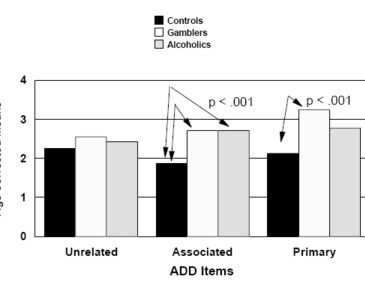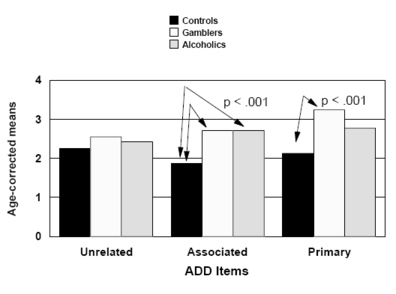Clinicians speculate that pathological gamblers may have an inability to “hold back” or inhibit a range of behaviors. Similarly, the failure to maintain attention and the inability to disregard distractions may reflect an attention deficit disorder (ADD). Both of these imply a regulatory deficit. A recent study compared pathological gamblers (n = 12), alcoholics (n = 12) and a control group (n = 15) for signs of ADD during childhood. The study found significant differences among these three groups. Specifically, for ADD-associated items, control scores were significantly lower than those of both alcoholics and gamblers, though alcoholics and gamblers did not differ. For items with a primary relationship to ADD, control scores were significantly lower than those of gamblers but not those of alcoholics. In contrast, as expected, the three groups did not differ in survey items unrelated to ADD. These findings suggest that alcoholics have ADD-related problems more than controls and that pathological gamblers have these problems even more than alcoholics. However, this research does not reveal whether these ADD-related problems are a cause or a consequence of excessive gambling.
Source: Carlton, P.L., & Manowitz, P. (1992). Behavioral restraint and symptoms of attention deficit disorder in alcoholics and pathological gamblers. Neuropsychobiology, 25, 44-48.
This public education project is funded, in part, by the Massachusetts Department of Public Health.
This fax may be copied without permission. Please cite The WAGER as the source.
For more information contact the Massachusetts Council on Compulsive Gambling, 190 High Street, Suite 6, Boston, MA 02110.






ADD or ADHD October 2, 2011
Why is it that there is so much study about attention deficit disorder ? If certain groups of people are being studied related to such behavior, could that be a way to identify if your child with ADD or ADHD can become one of those types of group of people?